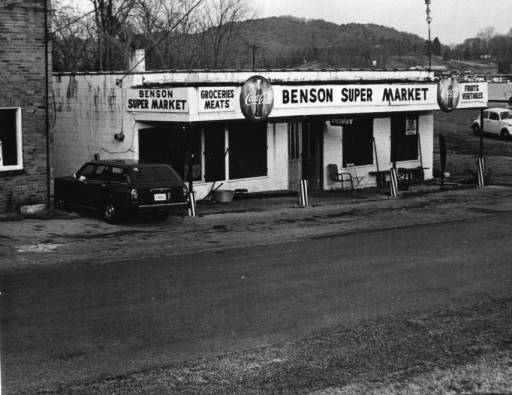Bob Dylan, American songwriter, once said, “You can find out a lot about a small town by hanging around its poolroom.”
As a young girl raised in a Southern Baptist family in the Concord/Farragut community, I wasn’t likely to inhabit such an establishment. Rather, in the 1950s my venue would have been the area grocery stores. Elders also believed that children were to be seen and not heard, so I picked up the local flavor by quietly listening.
The summer of 1952 would have been the last of times that I would be able to accompany my Irish grandfather, John L. “Red John” Smith, on his trips to Hobbs’ store. The grocery, owned by Lee Donaldson Hobbs and his wife, Lena McReynolds Hobbs, was the local gathering place on Front Street (now Lakeridge Drive). There on the liar’s bench, one could find whittlers and yarn spinners.

Hobbs’ Store (from writer’s collection)
The place was historical as it had a large “upping block,” formerly used to assist ladies on and off buggies. Fishermen gathered there in the late afternoon to tell of the ones that got away. Unless Miss Lena fixed me a bologna and watercress sandwich, I quietly sat on the bench sharing a can of sardines and a sleeve of saltines with Red John, washed down with a Grapette soda.
An on-going game of checkers between Russ Hobbs, son of Lena and L.D., and old Joe Cross, a kind and local Black man, taught me a few extra words I dared not say out loud. I was amazed at how two “friends” could burst into sudden spells of accusative warfare. The competition was fierce.
Further down Front Street across from the depot sat Benson’s grocery, owned by Charles T. and Pauline Missouri Hodges Benson, which could be considered the forerunner of today’s grocery stores. Canned goods and produce were on display on shelves where one could pick their own selection rather than have the store clerk reach behind the counter for the desired item.
Local gossip was always part of the shopping experience while I stood quietly by at the pickle aisle. Upon leaving the store with my mother, Mr. Charlie would secretly press a piece of bubble gum into my hand with a wink. Later, I would receive a raised eyebrow with the question “Now where did you get that, young lady?”
“Honest, I didn’t steal it. Mr. Charlie snuck it to me,” would be my reply.

The Noce General Store (Calvin M. McClung Historical Collection, Thompson Photograph Collection)
“Howa the hella are you, Roger?” would be the greeting my father always received at Joe and Nelle McDaniels Noce’s store, Canton Hollow at Kingston Pike. Mr. Noce, one of the area’s first naturalized citizens from Italy, not only sold groceries but sold and delivered coal to area residents.
It would take a while for one’s eyes to become accustomed to the interior which was dimly lit by one hanging light bulb. As I stood listening to the lively Italian banter, I was allowed to pet the gray cat that lazed on top of the meat counter. Mr. Noce would assure me: “Don’t mind him; he don’t eat much.”

Russell Store, early 1900s. (Courtesy of Farragut Museum)
Occasionally, I would be fortunate to accompany my mother to Russell’s grocery on Kingston Pike across from the old Farragut High School. The grocery was a popular place for Farragut students to gather before and after school.
The history of Russell store began in the early 1900s when it was located on the north side of Kingston Pike near Concord Road and operated by Matthew Lee Russell Sr. According to Farragut historian Doris Woods Owens, the store was washed from its foundation by flooding of Turkey Creek in the late 1920s and was relocated across from the high school. By the 1950s, the ownership had been passed down to a son, J. Frank “Doodle” Russell, and then to J. Frank “Doc” Russell Jr.
Westerly, at Dixie Lee Junction, sat Watson’s Store owned by George and Euna Wampler Watson. A young man named Tobe was always available to assist in carrying groceries to the car. Tobe collected ball-point pens which he proudly displayed in a pocket across the front of his bib overalls. Eyeing a customer’s pen, he would offer to swap pens. In route to the car, he would usually ask if one could spare a ‘nichol’ for an R.C. ‘cho-chola.’
By the sixties, the big box store A&P sat at the corner of Lovell Road and Kingston Pike. Red John and others have gone to their reward and are now a pleasant memory.
The lyrics from Bob Dylan’s song “The Times They Are A-Changin’” are relevant today. I visit Front Street from time to time. The upping block is still there, but it seems much smaller than I remember it.
Mona Isbell Smith is a retired computer systems analyst who enjoys freelancing.

